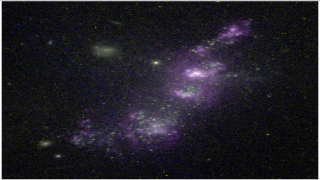Bibcode
Ruschel-Dutra, D.; Rodríguez Espinosa, J. M.; González Martín, O.; Pastoriza, M.; Riffel, R.
Bibliographical reference
Monthly Notices of the Royal Astronomical Society, Volume 466, Issue 3, p.3353-3363
Advertised on:
4
2017
Citations
19
Refereed citations
18
Description
It has been well established in the past decades that the central black
hole masses of galaxies correlate with dynamical properties of their
harbouring bulges. This notion begs the question of whether there are
causal connections between the active galactic nucleus (AGN) and its
immediate vicinity in the host galaxy. In this paper, we analyse the
presence of circumnuclear star formation in a sample of 15 AGN using
mid-infrared observations. The data consist of a set of 11.3 μm
polycyclic aromatic hydrocarbon emission and reference continuum images,
taken with ground-based telescopes, with sub-arcsecond resolution. By
comparing our star formation estimates with AGN accretion rates, derived
from X-ray luminosities, we investigate the validity of theoretical
predictions for the AGN-starburst connection. Our main results are: (i)
circumnuclear star formation is found, at distances as low as tens of
parsecs from the nucleus, in nearly half of our sample (7/15); (ii) star
formation luminosities are correlated with the bolometric luminosity of
the AGN (LAGN) only for objects with LAGN ≥
1042 erg s-1; (iii) low-luminosity AGNs
(LAGN < 1042 erg s-1) seem to have
starburst luminosities far greater than their bolometric luminosities.
Related projects

Starbursts in Galaxies GEFE
Starsbursts play a key role in the cosmic evolution of galaxies, and thus in the star formation (SF) history of the universe, the production of metals, and the feedback coupling galaxies with the cosmic web. Extreme SF conditions prevail early on during the formation of the first stars and galaxies, therefore, the starburst phenomenon constitutes a
Casiana
Muñoz Tuñón